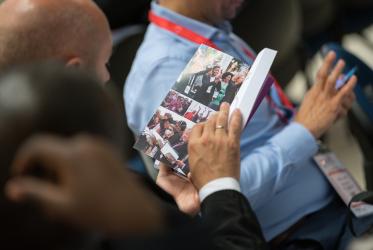Packed with powerful images, this letter takes us into the heart of the challenges associated with conflict and unity and reconciliation; into the heart of the relationship between the church, the world, and God’s coming reign. In the midst of serious conflict within the church, Paul’s authority is on the line. Of course, the Apostle’s spiritual wrestling with stubborn realities is exactly what makes this letter so fruitful.
And in chapter 5 we are entrusted with "the message of reconciliation,” rendering us “Christ’s ambassadors,” and as such called to build upon the radical reversal of the world’s values and priorities that Paul both teaches and exemplifies.
Here, in Christ, we are a “new creation.” Not simply set free from the world and its preoccupations with status and power, but set free for the Kingdom of God, to live joyfully in God’s presence as an Easter people. Called to rejoice, to live in hope, to live towards. To be ministers of reconciliation requires a journey, not just outwards towards others, in the spaces of difference and difficulty, in the midst of entrenched identities, but also inwards of spiritual renewal; a humility, an openness to being changed.
Here, in Christ, we are to regard no one “according to the flesh.” A phrase that conjures the exchanges between Jesus and the Pharisees, which reminds us of the danger of moralism; the techniques of private perfection, of self-regarding purity. This remains a real temptation for religious groups, for it grounds social solidarity in a sense of worthiness and discipline. Yet, it hollows out Christian faith, for no one is ever quite pure or good enough. And in the shadows of rigid moralism lie hypocrisy and exclusion—the poor and the marginalised are rarely represented, for, inevitably, they are seen as immoral, impure—altogether too messy.
In Christ, we are called to “the ministry of reconciliation,” which involves attending to the idea of the “wound.” True reconciliation is not about the bandage (bandages don’t heal) but the body, which with help, does the healing; indeed, it is the wound itself that heals when assisted by the fresh air, the openness that acknowledges that there is a problem, there is a hurting wound that needs to be seen, exposed and acknowledged; the cleansing of water, the purifying work of truth and justice. It stings; but it cleans; and, critically, the loving, attentive care of another that brings comfort.
We are “Christ’s ambassadors.” 2 Corinthians teaches us that the message and the messenger are united. As ambassadors, there is a straightforward expectation that people may see something of Christ in us. That is a confronting reality. Between the lines of 2 Corinthians, we sense Paul fighting for his spiritual life. He could have walked away, left Apollos or Peter or someone else to sort out. But instead he wrestles with God, sends a plumb-line down into his soul, places his confidence in Christ and makes himself vulnerable, so that others may truly understand what it means to be a minister of reconciliation in Christ, to be naked, stripped of all the clothing and protection of human culture and status, able to say of all his afflictions that the are slight and passing compared with the eternal weight of glory (4:17).






